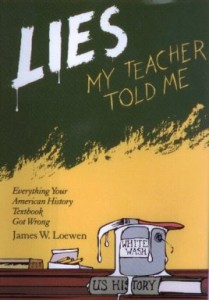This week’s threads highlighted the myths that have been told to you in school or are still taught to the general public. These threads just barely scratch the surface. Our history is very whitewashed. History is always written in the perspective of the ones in power.
What your teacher told you: As a student, your teacher has told you that you can be all that you can be. You can be a millionaire too. Just pull yourself by your bootstraps and you can be rich and successful. America is the best country in the world when it comes to social mobility. People are poor because they want to be. Capitalism is good, socialism and communism are bad. Everyone has the same equal opportunities.
The truth:
1. “High school students have eyes, ears, and television sets (all too man have their own TV sets), so they know a lot about relative privilege in American. They measure their family’s social position against that of other families, and their community’s position against other communities. Middle-class students, especially, know little about how the American class structure works, however, and nothing at all about how it has changed over time. These students do not leave high school merely ignorant of the workings of the class structure; they come out as terrible sociologists….The students blame the poor for not being successful. They have no understanding of the ways that opportunity is not equal in America and no notion that social structure pushes people around, influencing the ideas they hold and the lives they fashion.”
2. “High school textbooks can take some of the credit for this state of affairs. Some textbooks cover certain high points of labor history, such as the 1894 Pullman strike near Chicago…or the 1911 Triangle Shirtwaist fire that killed 146 women in New York City, but the most recent event mentioned in most books is the Taft-Hartley Act of fifty years ago. No book mentions the Hormel meat-packers strike in the mid-1980’s or the air traffic controllers’ strike broken by President Reagan. Nor do textbooks described any continuing issues facing labor…”
3. “Six of the dozen high school American history textbooks I examined contain no index listing at all for “social class,” “social stratification,” “class structure,” “income distribution,” “inequality,” or any conceivably related topic.”
4. “There is almost nothing in any of these textbooks about class inequalities or barriers of any kine to social mobility. “What conditions made it possible for poor white immigrants to become richer in the colonies?” Land of Promise asks. “What conditions made/make it difficult?” goes unasked.”
5. “Social class is probably the single most important variable in society. From womb to tomb it correlates with almost all other social characteristics of people that we can measure. Affluent expectant mothers are more likely to get prenatal care, enjoy general health, fitness, and nutrition. Many poor and working-class mothers-to-be first contact the medical profession in the last month… Rich babies come out healthier and go home to very different situations… Poor babies are more likely to have high levels of poisonous lead in their environments and their bodies… Rich children benefit from suburban schools that spend two to three times as much money per student as schools in inner cities or rural areas. Differences such as these help account for the higher school-dropout rate among poor children.”
6. “The tendency of teachers and textbooks to avoid social class as if it were a dirty littler secret only reinforces the reluctance of working-class families to talk about it.”
7. Why might they commit such a blunder? First and foremost, publisher censorship of textbook authors. “You always run the risk, if you talk about social class, of being labeled Marxist,” the editor for social studies and history at one of the biggest publishing houses told me.”
8. “But isn’t it nice simply to believe that America is equal? Maybe the “land of opportunity” archetype is an empowering myth—maybe believing might even help make it come true.”
9. “One way things are is unequal by social class. Although poor and working-class children usually cannot identify the cause of their alienation, history often turn them off because it justifies rather than explains the present.”

